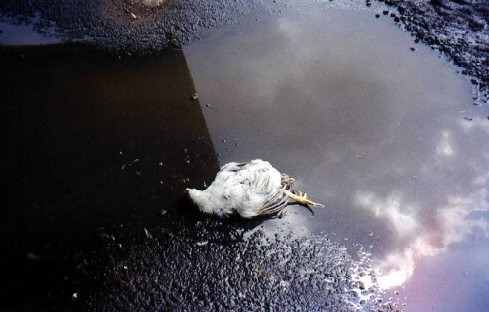Intensive Farming: The Earth is Not Your Garbage Dump
The Truth about Factory Farms and the Environment

Livestock and poultry in the United States produce 158 million tons of phosphate loaded,
feed additive and drug containing manure per year. They try, but it is simply impossible to
recycle ALL of this waste in environmentally sound ways like composting or using for
fertilizer. What a shame that what was once a "black gold" for farmers is now a
managerial headache because too many animals are living on not enough land. Eventually
it ends up in the groundwater, or running off with the rain into our bays and estuaries.
The concentrated nitrogen in chicken feces kills many plants, pollutes groundwater, and
contributes to excessive algal growth which overruns aquatic ecosystems, producing
stinking, deoxygenated conditions in which few creatures can survive.
Excess nitrogen in drinking water can cause methemoglobinemia, the blood disorder in
infants known as "Blue Baby Disease".
Large amounts of heavy metals like Manganese, Zinc, Iron, Copper, and Arsenic are
released into the environment from poultry farms.
Pfiesteria piscicida bacteria thrive in the manure polluted waters where they are
literally eating holes into the bodies of fish and cause severe neurological effects like
headache, violent moods, and memory loss when their toxins are inhaled by humans.
Fecal bacteria makes seafood inedible.
Disposal of the carcasses of chickens dying from stress and overcrowding is increasingly a
problem. The putrid remains of dead birds accumulate around the grounds of the farm,
and eventually they may be incinerated or buried in shallow pits that are havens for
bacteria which may escape into the groundwater.
Factory farming is a waste of resources. It is estimated that it takes 2.8lbs or grain, 0.19
gallons of gasoline, and 375 gallons of water to produce one pound of chicken. One-half
of all the energy used in American agriculture is used to produce meat.
